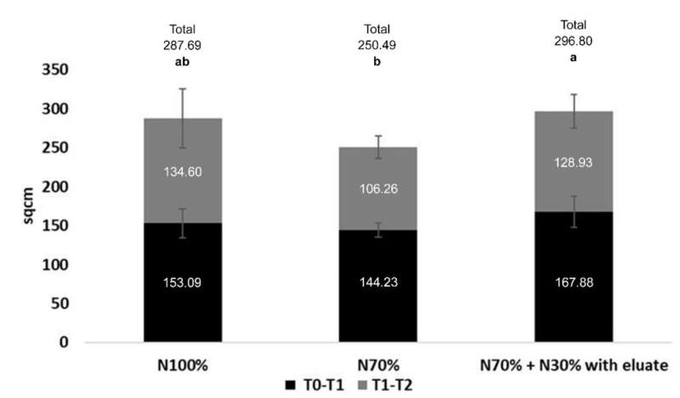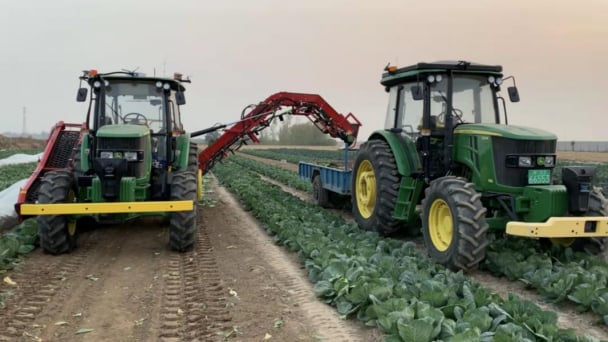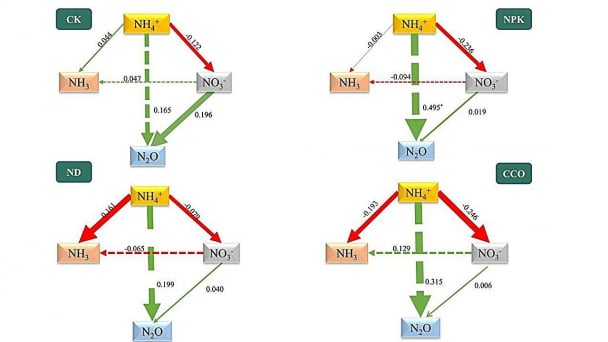June 30, 2025 | 10:28 GMT +7
June 30, 2025 | 10:28 GMT +7
Hotline: 0913.378.918
June 30, 2025 | 10:28 GMT +7
Hotline: 0913.378.918

Effect of the eluate on plant growth. The replacement of 30%N with the eluate filled the gap and surpassed N100% in the first growth phase (dark gray) and in total growth. The numbers in the bars are expressed in sqcm and indicate the difference between T0–T1 and T1–T2, while the total growth is shown above the bars. Thin light gray bars indicate 95% confidence interval. Bars labeled with different letters differ significantly (p < 0.05, Duncan test). Credit: Land (2022). DOI
This is the result of the study published in the journal Land and coordinated by Pier Sandro Cocconcelli, professor of Food Microbiology at the Faculty of Agricultural, Food and Environmental Sciences at Cattolica University, and Edoardo Puglisi of the Department of Food Science and Technology for a Sustainable Food Supply Chain—DiSTAS. The study was carried out in collaboration with the company Sacco srl of Cadorago (CO) and the agronomic assay center LandLab srl of quinto Vicentino (VI); Gabriele Bellotti, a Ph.D. student at the Agrisystem School of the Università Cattolica, is the first author.
Lactic acid bacteria
Lactic acid bacteria are a group of microorganisms capable of fermenting various substrates, giving rise to numerous products of interest to the agri-food and industrial sectors. Lactic acid bacteria are involved in the production of cheeses, fermented milks, and sausages.
"Lactic acid bacteria," Professor Cocconcelli says, "are produced for food and nutraceutical use, to produce foods, beverages and probiotics. Normally the waste from the culture substrate used in the production of lactic acid bacteria is cleared off by using purification plants; this is several thousand tons of waste produced each year in Italy."
The high environmental impact of chemical fertilizers
"The agricultural plant production sector is subject to new and complex challenges determined also by international economic and geopolitical conjunctures," Professor Pier Sandro Cocconcelli says, "as well as by an increasing attention of citizens and consumers towards environmental protection. "
The European Commission has committed, accordingly with the Farm to Fork strategy, to reduce by 2030 the use of fertilizers by 20%, nutrient losses from the soil by 50%, and the use of chemical pesticides by 50%.
Moreover, the geopolitical situation and especially the conflict in Ukraine have sharply raised prices of raw materials used in agriculture, starting with chemical fertilizers. "In this scenario, circular economy approaches, aimed at enhancing industrial waste by minimizing waste and reducing dependence on external inputs," Professor Cocconcelli says.
The study
The Italian researchers showed how it is possible to recycle waste from industrial production of lactic acid bacteria as fertilizers and biostimulants in agriculture.
Specifically, the trials focused on greenhouse cultivation of tomatoes and lettuce and demonstrated how the use of these industrial wastes makes it possible to reduce the amount of chemical nitrogen fertilizers by 30%, without reducing production at all and also improving some physiological characteristics of the plant.
In addition, they estimated that this approach could reduce by 40% greenhouse gas emissions associated with chemical fertilizer production.
"Extensive chemical, microbiological and ecotoxicological analyses have ruled out any negative impact on the environment and soil, indeed showing effects of promoting microorganisms useful for plant growth and defense," Professor Edoardo Puglisi explains.
The advantage of using this fertilizer would be that it would simultaneously nourish the plant (with direct and indirect nutrients), the soil bacteria that have positive effects on the plant, and the soil itself (enriching the humification rate of the soil). "It would thus be an ecological fertilizer in the broadest possible meaning, able to stimulate the whole system and not just one organism at the expense of others," Professor Cocconcelli points out.
"This study shows the ability of research in the agricultural sector to quickly provide solutions to contingent emergencies in the sector," Professor Puglisi concludes; it is also a virtuous example of technology transfer, demonstrated by the fact that the company Sacco srl involved in the project is now recycling more than 700 tons per year of residues from their production process with this approach.
(Phys.org)

(VAN) Director-General QU Dongyu addresses the 6th AU-EU Agriculture Ministerial Conference.

(VAN) In the suburbs of Beijing, there is an agricultural center spanning over 150 hectares dedicated to research, demonstration, and application of high-tech and precision agriculture.

(VAN) Researchers from the Institute of Applied Ecology of the Chinese Academy of Sciences have developed a new environmentally friendly fertilizer additive that significantly enhances crop yields while reducing emissions of harmful gases.

(VAN) Poultry production in Poland, which has only started recovering from devastating bird flu outbreaks earlier this year, has been hit by a series of outbreaks of Newcastle disease, with the veterinary situation deteriorating rapidly.

(VAN) Extensive licensing requirements raise concerns about intellectual property theft.

(VAN) As of Friday, a salmonella outbreak linked to a California egg producer had sickened at least 79 people. Of the infected people, 21 hospitalizations were reported, U.S. health officials said.

(VAN) With the war ongoing, many Ukrainian farmers and rural farming families face limited access to their land due to mines and lack the financial resources to purchase needed agricultural inputs.